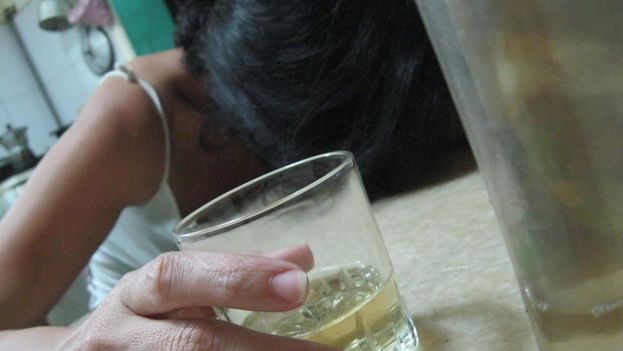
![]() 14ymedio, Zunilda Mata, Havana, 18 January 2016 – From the bar home, from home to the bar, so passes the life of Fico, a Havanan of 65 who has struggled for more than two decades against alcoholism. His situation is frequently repeated in a society where more than 45% of those over age 15 drink alcohol, according to research by the National Unit for Health Promotion and Disease Prevention published this Monday in the official press.
14ymedio, Zunilda Mata, Havana, 18 January 2016 – From the bar home, from home to the bar, so passes the life of Fico, a Havanan of 65 who has struggled for more than two decades against alcoholism. His situation is frequently repeated in a society where more than 45% of those over age 15 drink alcohol, according to research by the National Unit for Health Promotion and Disease Prevention published this Monday in the official press.
Cubans between 15 and 44 are the most frequent consumers of alcohol. Differences in consumption between the sexes are also narrowing, and drinking is no longer a “man’s thing” as was erroneously believed until recently.
The most recent studies warn that Cuban women are increasing their consumption of alcohol. The share of men who drink is 47% while for women it is more than 19%. In the case of women, they suffer greater rejection, being in a macho society, and they wait longer to seek expert help.
Experts also warn that alcohol does more harm to women because they have less body fluid than men. The saturation or condensation of substances in the body is higher and the level of toxicity faster and more intense for women.
A survey in 2014 showed that consumption before age 15 is more common in men than women, with rates of 11% vs. 3% respectively.
Alcoholism is among the top ten causes of death in Cuba. In late 2015, a report form the National Transportation Directorate detailed that in that year in Cuba, 17 people had lost their lives and more than 140 were injured in traffic accidents where it was shown that some of the parties had higher levels of alcohol than permitted.
Urban areas have the highest rates of alcohol consumption, both for men and women, but overall the highest rates were recorded in the central region of the country, where 53% of men are drinkers.
Education also influences consumption, as women with higher levels of education levels consumed more alcohol, some 24% more than those with the least schooling. Among men, however, the opposite phenomenon occurs and the highest percentage of drinkers is among those with little education.
Health officials are calling on the Community Mental Health Centers and specialized consultations in polyclinics to make a call to help those in need of treatment or counseling for alcohol issues.
There are more than 200 Alcoholics Anonymous groups in the country, with the entry of that organization into Cuba dating back to 1993; they mainly hold their meetings in facilities provided by Catholic and evangelical churches.
